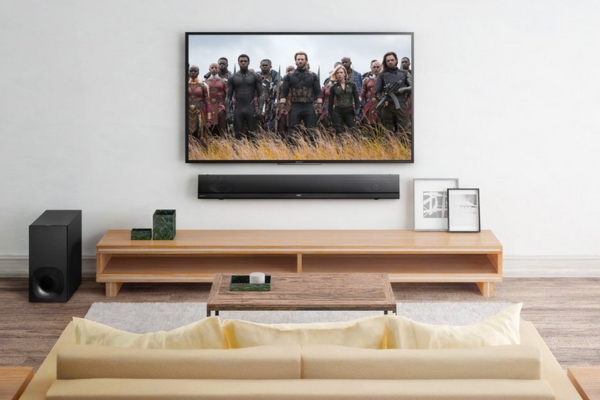Can a Soundbar Work with a Receiver?
As home audio setups become more customizable, many users wonder if it’s possible to integrate a soundbar into an existing AV receiver system. This question often arises when someone is upgrading their home theater or repurposing older equipment. And understanding how soundbars and receivers work together is key to making the right choice.
Soundbars are popular for their convenience, compact size, and affordability. Designed to connect directly to a television, they eliminate the need for separate components like amplifiers or receivers. But what if there’s already a receiver in place, can a soundbar be connected to it? The answer depends on the type of soundbar and the intended setup.

Why Connect a Soundbar to a Receiver?
Most soundbars are self-contained systems with a built-in amplifier, which powers the internal speakers. This design makes setup quick and straightforward, but it also means that connecting a soundbar to a receiver is generally unnecessary—and in many cases, not recommended.
The Problem with Dual Amplification
Both a receiver and a typical soundbar contain amplifiers. When connected together, these amplifiers can interfere with each other, potentially leading to audio distortion or performance issues.
If a receiver already includes a high-quality amplifier, investing in a soundbar with its own amp becomes redundant. In such cases, it’s more cost-effective and sonically rewarding to purchase high-performance speakers that can be powered directly by the receiver.
An amplifier boosts low-level audio signals to a level suitable for driving speakers. When both a soundbar and a receiver try to perform this task simultaneously, it can create signal distortion, volume issues, or even damage components.
This is known as double amplification or cascading amplification, and it’s one of the most common pitfalls when mixing self-powered and externally powered audio gear.
A Better Alternative: Speakers for the Receiver
Enhancing a home audio setup by adding speakers to a receiver offers several advantages:
- Superior Amplification: The amplifier in a dedicated receiver is often more powerful and higher quality than the one found in a typical soundbar.
- Improved Sound Separation: Using standalone speakers allows for better channel separation and stereo imaging. Soundbars, due to their compact design, often rely on digital processing to simulate this effect.
Compact bookshelf speakers are a great alternative for those with limited space. Brands like Klipsch and Bang & Olufsen offer excellent small speakers that deliver rich, immersive sound without taking up more room than a soundbar.
>> The Best Bookshelf Speakers on the Market <<
Using a Passive Soundbar with a Receiver
For those determined to integrate a soundbar into a receiver-based system, a passive soundbar is the way to go. Unlike active soundbars, passive models don’t have built-in amplifiers and are designed to be powered by an external receiver. These models typically offer higher fidelity and emphasize speaker quality, making them a premium sound bar choice.
Be warned, however, passive soundbars can be expensive. In many cases, the same budget could secure a pair of high-quality stereo speakers that offer better spatial separation and fuller sound coverage.
When Might It Make Sense to Use a Soundbar with a Receiver?
While connecting a soundbar to a receiver is generally discouraged due to double amplification and compatibility concerns, there are a few niche cases where it can make sense.
1. Using Older Receivers Without Modern Outputs
In situations where a receiver lacks HDMI ARC or optical audio outputs but includes RCA pre-outs, and the soundbar supports analog input, the two devices can be connected as a workaround. This setup might not deliver optimal sound quality but can serve as a stopgap for those looking to repurpose older equipment.

2. Multi-Zone Audio Applications
AV receivers with zone 2 or zone 3 capabilities can benefit from a passive soundbar as a speaker option in a second room. In this case, the passive soundbar acts as a simple stereo speaker solution in spaces where aesthetics or space constraints are important.
3. Center Channel Replacement
Some passive soundbars are designed specifically to function as center-channel speakers within a 5.1 or 7.1 system. These models offer a streamlined alternative to traditional center speakers and can fit neatly under televisions or within media consoles, providing both functionality and a clean look.
Although these setups are highly situational, they prove that soundbars and receivers aren’t always mutually exclusive, as long as you use the correct equipment.
Final Verdict: Can a Soundbar Work with a Receiver?
So, can a soundbar work with a receiver? Technically, yes, but it’s not always advisable. The process often introduces unnecessary complexity and may lead to issues caused by redundant amplification.
Instead, upgrading the receiver’s connected speakers is usually a more efficient and acoustically rewarding solution. If you insist on connecting yours, it’s worth considering whether the investment would be better spent on enhancing the existing speaker setup.
Check out more from our Soundrating Blog
Are Bluetooth Wireless Headphones Safe for Your Brain?
How to Choose the Right Soundbar for Your Home
In-Wall vs In-Ceiling Speakers: Which Is Right for Your Home?

I am a passionate and skilled car audio enthusiast with 15 years of experience in the industry. My journey started when I replaced my first set of factory car speakers, sparking a deep love for high-quality sound. Since then, I have worked as a representative for renowned brands like Kenwood and Alpine.
With a background in both retail and distribution, I have developed a comprehensive understanding of the car audio market. Currently a certified (MECP) installer in the Mobile Electronics industry, my expertise lies in delivering top-notch audio installations. My knowledge, coupled with my genuine passion, makes me the go-to professional for all car audio needs.
